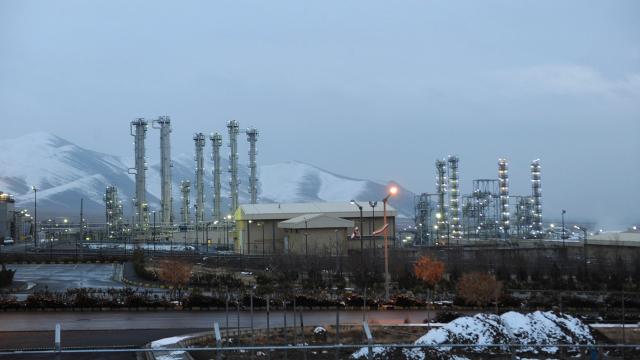Last year, Donald Trump made the very public decision to abandon the 2015 deal between Iran and Western nations limiting Iran’s nuclear program in exchange for sanctions relief. Iran kept to the terms of the deal for some time regardless, but on Monday it said it would be exceeding uranium enrichment limits imposed in the original agreement within “a few hours,” the Los Angeles Times reported.
Iran has already exceeded another limit on its stockpiles of uranium enriched to 3.67 per cent purity, which the 2015 deal restricted to 660 pounds.
On Saturday, Ali Akbar Velayati, the international affairs advisor to Supreme Leader Ayatollah Ali Khamenei, was quoted in an interview on a government website as saying that a nuclear power plant in Bushehr required uranium enriched to five per cent, according to the L.A. Times.
Iran is not allowed to have uranium enriched to this level under the deal.
According to the New York Times, deputy foreign minister Abbas Araghchi said at a press conference on Sunday that Iran would step up its violations of the 2015 arrangement unless the remaining signatories—Britain, France, Germany, Russia and China—relax sanctions that have strangled Iran’s economy and reduced its oil exports by 90 per cent. The NY Times noted that while Iran is still nowhere close to obtaining a nuclear weapon, which would require uranium enriched much closer to 90 per cent as well as advanced warhead and missile technology, stepping up the violations is still a risky move:
But for Iran’s president, Hassan Rouhani, who signalled in May that he would order the country’s engineers to cross both thresholds if Europe did not compensate Iran for American sanctions, the breach of the enrichment limit would be a watershed. He is betting that the United States will back away from crushing sanctions or that he can split European nations from the Trump administration, which the Europeans blame for setting off the crisis.
If he is wrong, the prospect of military confrontation lurks over each escalation.
The Trump administration has accused Iran’s Revolutionary Guard Corps of being behind a string of attacks on oil tankers, as well as shooting down a U.S. drone.
Escalating tensions between the U.S. and Iran have reportedly included a series of cyber attacks launched by both sides.
The LA Times reported that Behrouz Kamalvandi, a spokesman for Iran’s Atomic Energy Organisation, said there was still no need for Iran to enrich uranium to 20 per cent purity. That level would put Iran much closer to having weapons-grade materiel.
Araghchi also said that Iran had begun to reconstruct its Arak heavy water reactor, which had concrete poured into its core after the 2015 deal; that facility could be reconfigured to produce plutonium, though the NY Times reported in 2015 that experts say “the military threat from an unfinished plutonium complex can be viewed as abstract compared with Iran’s success at purifying uranium in its two underground plants.”
According to the NY Times, French President Emmanuel Macron reached out to Iranian President Hassan Rouhani on Monday to inquire about restarting negotiations.
But former National Security Council official Rob Malley was sceptical that another accord involving the U.S. was possible, telling the paper Trump’s administration “has discredited the very concept of negotiations, and it has strengthened the hand of those inside Iran who would argue that it is no use talking to the Americans because you can never trust them… We have already gone through a period of sanctions, negotiations and a deal, and this time it will be harder because the distrust is even greater than it was.”
The Wall Street Journal reported that European officials could, if negotiations are not renewed, call a meeting that would start a “weekslong process that could end with international sanctions being reimposed on Tehran, effectively killing the accord.”
